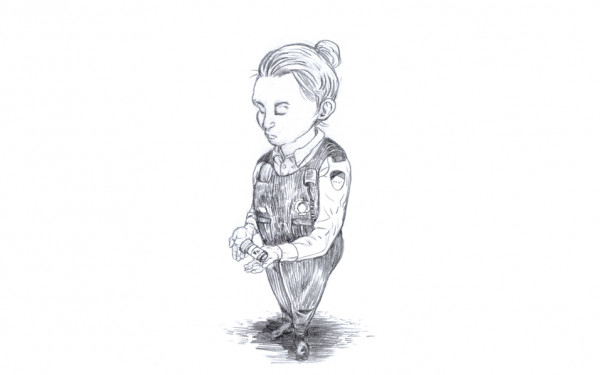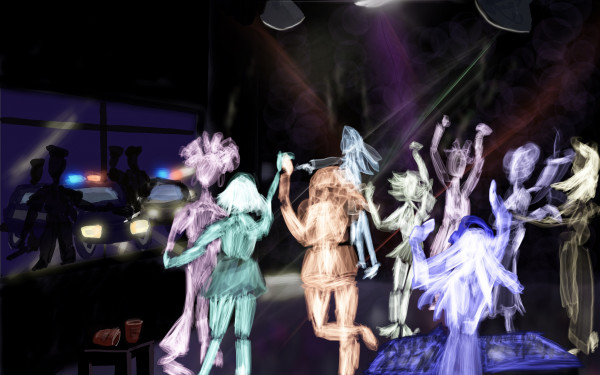What Occupation?
#6party Ends at McGill
On Monday the occupiers were back, but this time, they were on the outside looking in.
Approximately 50 students gathered for two hours outside McGill University’s James Administration Building in support of the sixth floor occupiers, who had been evicted the day before.
The occupation originally started on Feb. 7 when a group of 23 students entered the administration building for a “surprise resignation party” in honour of Deputy Provost Student Life and Learning Morton Mendelson.
Early Sunday morning, the McGill administration called the Service de Police de la Ville de Montréal to assist with the eviction. The occupation was entering its fifth day with no end in sight as negotiations had stalled between the occupiers and the administration.
“The protestors told [McGill VP University Services James Nicell] that they were disconnecting the land line we provided and would not talk any more,” wrote VP Administration and Finance Michael Di Grappa in an update to McGill students.
“After many […] tactics to make the protestors uncomfortable in the space and after discussion of other options, we were no closer to a resolution.”
Those tactics included cutting the occupiers’ Internet access, electricity and eventually washroom facilities as time wore on.
“The administration never tried to negotiate with us,” said an occupier who asked to be identified as Steve. “The man they sent to talk to us did not have the power to do anything—that’s what he told us.”
The eviction went peacefully according to both occupiers and the university. After being read a notice of eviction, they agreed to leave the premises, thus avoiding criminal charges for resisting arrest.
Later that day, the university released a “Protocol Regarding Demonstrations, Protests, and Occupations on McGill University Campuses.”
The protocol establishes temporary rules and guidelines until the university officially responds to the Jutras Report, which was commissioned after riot police controversially entered the campus during another occupation of the building on Nov. 10.
One of the protocols deals with occupations, stating, “If any type of occupation occurs and the occupiers refuse to leave when requested to do so, civil authorities will be called.”
It wasn’t long before the protocol was disregarded, according to an occupier who asked only to be identified as Becca, referring to the support rally.
“Today we broke the protocol already, because we took the demonstration inside of a building, which was against it.”
For Steve, the occupation was a success. He cited negotiations between the administration and student groups CKUT—McGill’s campus radio station—and the McGill chapter of the Quebec Public Interest Research Group.
“We had people inside QPIRG, and they said that during our occupation, McGill was much more anxious to negotiate with QPIRG than they had been before.”
“We proposed a tripartite meeting with the student occupiers, QPIRG and the administration to talk about a referendum question,” said Simone Lucas, who sits on the QPIRG Board of Directors.
“That proposal was denied.”
The occupation was a protest against a recent decision by the administration to invalidate the referendums held by CKUT and QPIRG, in which students had voted to institute an in-person opt-out system for the fee levies paid to the groups, effectively making it harder to opt out.
The administration had overruled the results of the election, saying the questions were unclear, as they dealt not just with the opt-out system, but also asked students if they supported maintaining the groups’ fee levies in general.
“What was very clear was that the questions asked were not clear, because they were asking two separate things at the same time,” said McGill’s Director of Media Relations Doug Sweet.
The occupiers had two demands: that the referendum be recognized and that Mendelson resign.
“Of the administration, he is the one who is supposed to represent student interests directly, and he absolutely does not,” said Becca.
The occupiers were not directly involved with either QPIRG nor CKUT.
“We made sure that [of] QPIRG and CKUT, none of them were involved, because we did not want the administration to be able to use this against those organizations,” said Becca. “We were independent students who really care about those organizations.”
Other students then decided to occupy the ground floor of the building in solidarity with those on the sixth floor. They left on Wednesday morning after having their access to the washroom cut off.
On Feb. 10, the administration announced it would recognize part of the CKUT referendum. The radio station will maintain its fee levy, but will have a new referendum regarding its opt-out system in March.
According to Caitlin Manicom, funding and outreach coordinator at CKUT, the agreement was reached before the beginning of the occupation. “CKUT played no role in organizing the occupation of the James Administration Building,” said Manicom. “We were completely taken off-guard.”
The occupation did not gather unanimous support from the McGill community. A Facebook event called “The James 6th Floor Occupiers do NOT Represent Me” counted approximately 2,100 attendees at press time.
Twitter was also the scene of heated discussions about the occupation. One person, tweeting from @OccupyMcGill, regularly criticized the occupiers, and spoke to The Link on condition of anonymity.
“It’s another case of a small group of students taking over the dialogue and occupying a building,” he said.
“I haven’t seen the admin become more extreme. I have seen student groups become more extreme.”
—with files from Riley Sparks

_900_600_90.jpg)



7138_600_375_90_s_c1.jpg)

